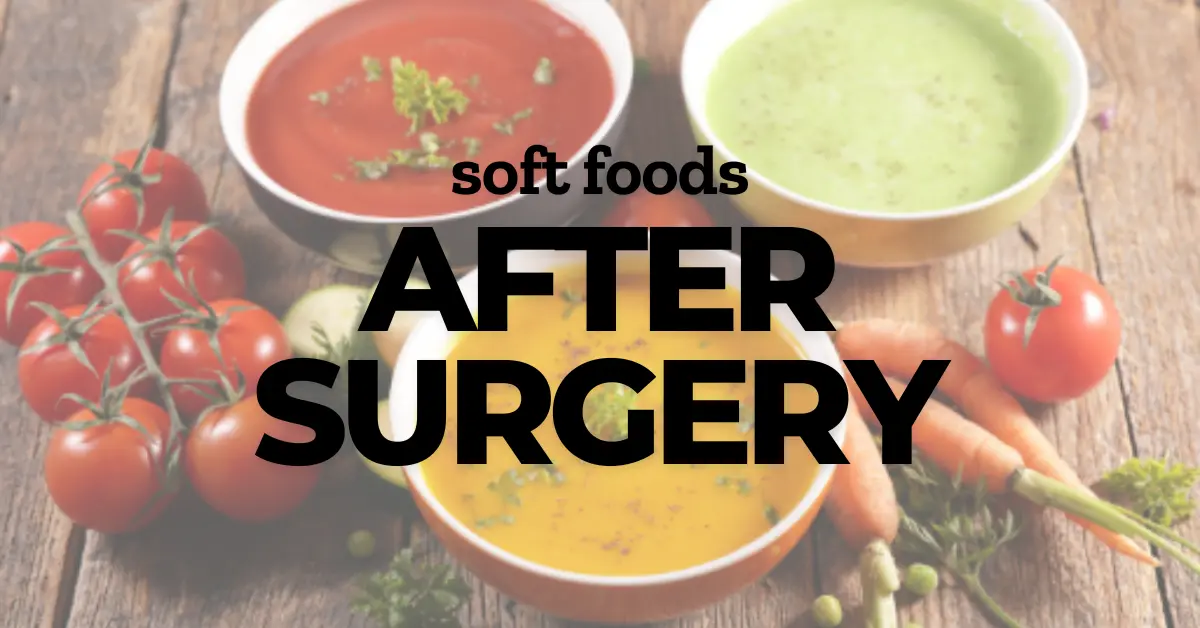Recovering from surgery requires more than just rest and medication—it also demands careful attention to your diet. Soft foods after surgery play a crucial role in promoting healing, reducing discomfort, and ensuring your body gets the nutrients it needs. Whether you’ve undergone dental surgery, abdominal procedures, or any other operation, incorporating the right soft foods into your diet can make a significant difference in your recovery journey.
In this article, we’ll explore the importance of soft foods after surgery, provide a list of nutritious options, and offer practical tips to help you plan your meals effectively.
Why Are Soft Foods After Surgery Essential?
After surgery, your body is in a delicate state, and your digestive system may not be ready to handle heavy or hard-to-chew foods. Soft foods after surgery are easier to digest, reduce strain on your body, and minimize the risk of complications. Here’s why they are so important:
- Promote Healing: Soft foods are rich in essential nutrients like protein, vitamins, and minerals that aid tissue repair and recovery.
- Reduce Discomfort: Chewing hard or crunchy foods can cause pain, especially after oral or facial surgeries. Soft foods eliminate this issue.
- Prevent Complications: Eating soft foods reduces the risk of choking, irritation, or damage to surgical sites.
- Boost Energy: They provide the calories and nutrients needed to regain strength without overburdening your system.
Best Soft Foods After Surgery:
Choosing the right soft food after surgery is key to a smooth recovery. Here’s a categorized list of nutritious and easy-to-eat options:
1. Protein-Rich Soft Foods:
Protein is vital for tissue repair and muscle recovery. Opt for:
- Scrambled eggs
- Greek yogurt
- Cottage cheese
- Silken tofu
- Soft-cooked fish
2. Carbohydrate-Based Soft Foods:
Carbs provide energy and help maintain blood sugar levels. Consider:
- Mashed potatoes
- Oatmeal
- Soft pasta
- Rice pudding
- Pureed soups
3. Fruits and Vegetables:
These are packed with vitamins and antioxidants. Try:
- Applesauce
- Mashed bananas
- Steamed and pureed carrots
- Avocado
- Blended smoothies
4. Hydrating Options:
Staying hydrated is crucial. Include:
- Broths and clear soups
- Herbal teas
- Fruit juices (without pulp)
- Gelatin desserts
Foods to Avoid After Surgery:
While focusing on soft foods after surgery, it’s equally important to avoid certain foods that can hinder recovery:
- Crunchy or Hard Foods: Nuts, chips, and raw vegetables can irritate surgical sites.
- Spicy Foods: These may cause discomfort or inflammation.
- Acidic Foods: Citrus fruits and tomatoes can irritate sensitive areas.
- Sugary Treats: Excessive sugar can weaken the immune system and delay healing.
How to Plan Your Post-Surgery Diet?
Planning your meals around soft foods after surgery doesn’t have to be overwhelming. Here are some tips to help you get started:
- Consult Your Doctor: Always follow your surgeon’s dietary recommendations.
- Prepare in Advance: Stock up on soft foods before your surgery to avoid last-minute stress.
- Focus on Variety: Incorporate different types of soft foods to ensure a balanced diet.
- Small, Frequent Meals: Eat smaller portions throughout the day to avoid overloading your digestive system.
- Stay Hydrated: Drink plenty of fluids to support healing and prevent dehydration.
Comparison: Soft Foods vs. Regular Foods After Surgery
Understanding the difference between soft and regular foods can help you make better dietary choices during recovery.
| Aspect | Soft Foods After Surgery | Regular Foods |
|---|---|---|
| Ease of Digestion | Easy to digest, gentle on the body | May be harder to digest |
| Nutrient Density | High in essential nutrients | Varies widely |
| Risk of Irritation | Low risk of irritating surgical sites | Higher risk of irritation |
| Preparation Time | Often quick and simple | May require more effort |
This comparison highlights why soft foods after surgery are the better choice for recovery.
Tips for Making Soft Foods More Enjoyable:
Eating the same foods repeatedly can become monotonous. Here are some creative ways to make soft foods after surgery more enjoyable:
- Add Flavor: Use herbs, mild spices, or broth to enhance the taste of pureed soups and mashed dishes.
- Experiment with Textures: Blend foods to different consistencies to keep things interesting.
- Incorporate Variety: Rotate between sweet and savory options to satisfy different cravings.
- Presentation Matters: Serve your meals in attractive bowls or plates to make them more appealing.
Conclusion:
Recovering from surgery is a critical time, and your diet plays a pivotal role in how quickly and effectively you heal. Soft foods after surgery are not just a recommendation—they are a necessity for ensuring a smooth and comfortable recovery. By choosing nutrient-rich, easy-to-digest options and avoiding foods that can cause irritation, you can support your body’s healing process and regain your strength faster.
Remember, every individual’s recovery journey is unique, so always consult your healthcare provider for personalized dietary advice. With the right approach, you can turn your post-surgery diet into a powerful tool for healing.
FAQs:
1. Why are soft foods recommended after surgery?
Soft foods are easier to digest, reduce discomfort, and minimize the risk of irritating surgical sites.
2. What are some protein-rich soft foods?
Scrambled eggs, Greek yogurt, cottage cheese, and soft-cooked fish are excellent options.
3. Can I eat fruits after surgery?
Yes, but opt for soft fruits like bananas, avocados, or applesauce. Avoid acidic or crunchy fruits.
4. How long should I eat soft foods after surgery?
The duration varies depending on the type of surgery. Follow your doctor’s recommendations.
5. Are there any foods I should avoid after surgery?
Yes, avoid crunchy, spicy, acidic, or overly sugary foods that can irritate or delay healing.
6. Can I drink smoothies after surgery?
Absolutely! Smoothies are a great way to consume nutrients, but avoid using straws if you’ve had oral surgery.
By prioritizing soft foods after surgery, you can ensure a smoother, faster, and more comfortable recovery. Your body will thank you for the care and attention you give it during this critical time.











